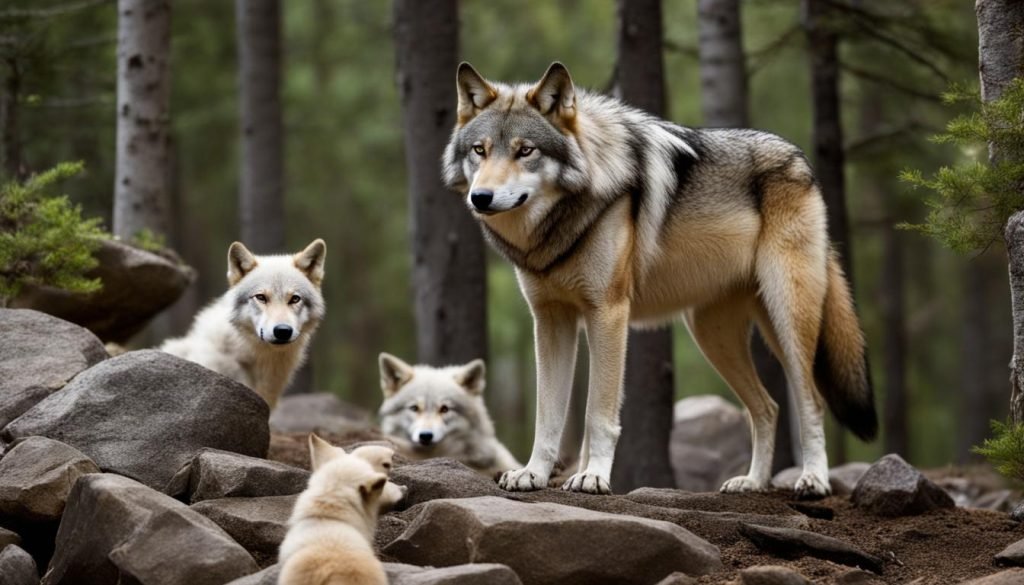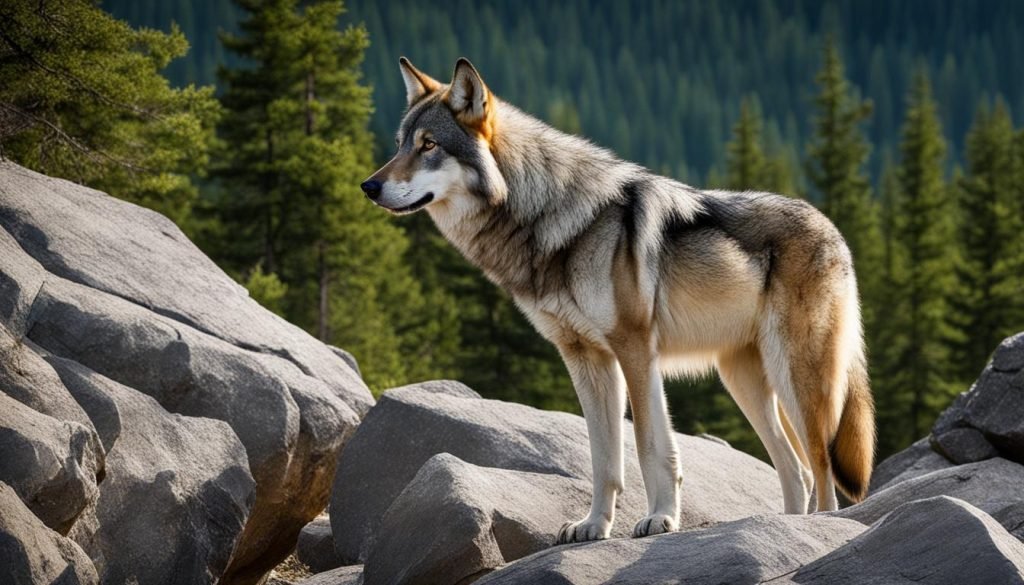Wolves Lifespan: How Long Do Wolves Live?
Wolves are fascinating creatures that have piqued the interest of humans for centuries. One of the most commonly asked questions about wolves is “How Long Do Wolves Live?”.
The average lifespan of a wolf in the wild is around 6-8 years. However, wolves in captivity or under human care can live up to 16 years or more.
Several factors can affect the lifespan of wolves, including genetics, habitat, food availability, and human interactions. Understanding the life cycle and aging process of wolves can also provide insights into their longevity and overall well-being. With proper conservation efforts and care, we can help ensure the continued existence and thriving of these magnificent creatures.
Key Takeaways:
- The average lifespan of a wild wolf is around 6-8 years.
- Wolves in captivity or under human care can live up to 16 years or more.
- Genetics, habitat, food availability, and human interactions can impact the lifespan of wolves.
- Understanding the life cycle and aging process of wolves can provide insights into their longevity and overall well-being.
- Conservation efforts and care are essential to ensuring the continued existence and thriving of wolves.
Factors Affecting Wolf Lifespan

While wolves have a unique ability to adapt to their surroundings, their average lifespan varies due to various factors that impact their longevity. Let’s explore some of these factors below:
- Genetics: As with most living organisms, genetics play a significant role in determining the lifespan of wolves. DNA mutations and genetic predispositions can impact wolves’ health, making them more susceptible to diseases and infections.
- Habitat: The environment in which wolves live greatly affects their lifespan. Living in a habitat that provides ample resources such as food, water, and shelter can significantly improve a wolf’s life expectancy.
- Food Availability: The availability of prey and food sources directly affects the lifespan of wolves. Scarcity of food can lead to malnourishment, which can weaken wolves’ immune systems and leave them susceptible to diseases.
- Human Interactions: Wolves are often hunted and killed by humans, leading to a decline in their population. Additionally, human activities such as habitat destruction, pollution, and climate change can impact wolf populations, significantly affecting their lifespan.
It is worth noting that wolves’ longevity can vary depending on whether they are in the wild or under human care. Wolves in captivity tend to have longer lifespans due to controlled environments, where they are fed well and protected from threats like poaching and habitat loss. On the other hand, wild wolves face various challenges that require them to be highly adaptable and resilient to survive.
Wolf Quiz
How well do you know wolves? Test your knowledge below!

How Long Do Wolves Live: Wolf Life Cycle

Understanding the duration of a wolf’s life is vital to learning about their overall lifespan. Wolves go through distinct stages during their lives, with each stage affecting their lifespan and wolf life expectancy.
Birth: Wolf pups are born blind, deaf, and unable to regulate their body temperature. They are entirely reliant on their mother for warmth, food, and protection. The first few weeks of a wolf pup’s life are critical to their survival. At this stage, their wolf life expectancy depends on whether they receive adequate care and nourishment from their mother.
Adolescence: As wolf pups grow, they begin to explore their surroundings and play with their littermates. They learn important survival skills, such as hunting and socializing, during this stage. The duration of adolescence in wolves varies depending on the population and environmental factors.
Adulthood: Wolves reach adulthood at around two years of age. During this stage, they establish their social hierarchy within the pack, find a mate, and start breeding. Wolves can live for many years as adults, depending on various ecological factors and their overall health.
Old Age:
Like any other living beings, wolves experience aging. The average lifespan of wolves is approximately 6-8 years in the wild and 10-15 years in captivity.
Physiological Changes: Aging in wolves leads to various physiological changes. For instance, wolves’ teeth wear down, decreasing their ability to grip and chew food. Their hearing and vision also deteriorate, making it more challenging to hunt.
Behavioral Changes: In wolves, aging leads to several behavioral changes as well. They become less active and spend more time resting. They may also become more aggressive and territorial towards their pack-mates.
Overall, whether wolves live in the wild or captivity, their wolf life expectancy depends on various factors such as genetics, habitat, food availability, and human interactions. Understanding the different stages of the wolf life cycle and how they influence their lifespan can help us better protect and care for these magnificent creatures.
Aging in Wolves

Wolves, like other living beings, undergo various physical and behavioral changes during their aging process. As wolves age, their senses start to weaken, making it difficult for them to hear, see, and smell. They also experience a reduction in muscle mass and a decrease in mobility, leading to difficulty in hunting and feeding.
Did you know? On average, wolves begin to experience aging symptoms at around six to eight years of age.
During their old age, wolves may develop health issues such as arthritis, dental problems, and organ failure, which can further reduce their lifespan. It’s crucial to ensure that wolves have access to proper medical care and a balanced diet to maintain their health in their old age.
The average lifespan of wolves in the wild is around six to eight years, while wolves in captivity can live up to 16 years or more. However, factors such as genetics, habitat, and food availability can impact the lifespan of wolves, leading to differences in lifespan among individuals and populations.
To promote the longevity of wolves, it’s crucial to address human-wolf conflicts and conserve wolf habitats. Initiatives aimed at promoting wolf conservation and education can also raise awareness about the importance of protecting these magnificent creatures.
Longevity in Wild Wolves
While wolves under human care often have longer lifespans due to access to medical care and a consistent food supply, wild wolves face a range of challenges that impact their longevity.
Impact of Ecological Factors
The lifespan of wild wolves is heavily influenced by the environment they inhabit. Factors such as climate change, habitat destruction, and food scarcity can all impact their survival rates. For example, a decrease in prey abundance due to habitat loss or overhunting can lead to malnourishment and a lower life expectancy among wolves. Additionally, competition with other predators for food and territory can also impact their chances of survival.
Wolf Life Expectancy
The average lifespan of wild wolves varies depending on geographical location and species. In North America, gray wolves typically live for 6-8 years in the wild, while red wolves have an average lifespan of 4-5 years. In Europe, wolves can live up to 14 years in the wild if they can survive the harsh winters and avoid human threats. Meanwhile, in Asia, Himalayan wolves can live up to 16 years in the wild.
The Role of Human Interactions
Human-wolf conflicts, including hunting, trapping, and habitat destruction, also play a significant role in determining the lifespan of wild wolves. While legislation and conservation efforts have helped to mitigate some of these threats, illegal hunting, and habitat destruction continue to pose risks to wolf populations.
Preserving the Lifespan of Wild Wolves
Protecting the natural habitats of wild wolves, reducing human-wolf conflicts, and promoting public education about wolf conservation are all critical to ensuring the longevity of these magnificent creatures. Conservation organizations and government agencies can work together to develop sustainable policies and programs that support healthy wolf populations for generations to come.
Ensuring Wolf Conservation and Care

It is crucial to protect the lifespan of wolves by promoting conservation efforts and ensuring their well-being. With the importance of maintaining the balance of ecosystems, it is our responsibility to protect these magnificent creatures.
Many conservation initiatives aim to increase the lifespan of wolves, such as preserving their habitats and promoting education about their survival. Humans are responsible for many conflicts that endanger wolf populations. We need to address these problems to protect their longevity, including habitat loss, hunting, and poaching.
One way to ensure the lifespan of wolves is by supporting local organizations dedicated to wolf conservation and rehabilitation. These organizations provide knowledge about these creatures and promote conservation efforts, often with the support of community volunteers.
Additionally, individuals can take steps to promote wolf conservation by reducing their impact on the environment. This can include using sustainable products and reducing waste to decrease pollution that can harm wolf populations. It is also essential to respect their natural habitats, avoiding any disruption that can displace or endanger their lifespan.
To ensure the long lifespan of wolves, it is critical to promote their conservation and support efforts that strive to minimize conflicts between wolves and humans. By taking these measures, we can help sustain the populations of these majestic creatures for generations to come.







